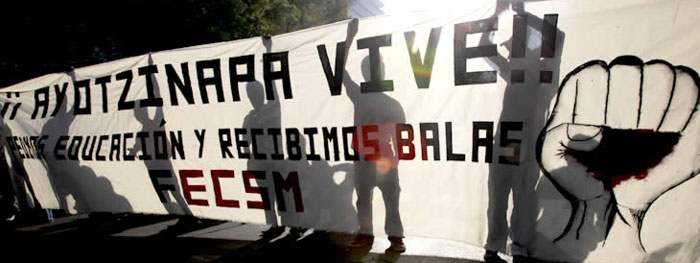Hilda and Mario González Hernández are the parents of Cesar Manuel, a 21 year-old student from the Ayotzinapa teacher training college. Together with 42 of his fellow students, Cesar Manuel was last seen in the town of Iguala in the state of Guerrero on the night of 26 September. Hilda and Mario are now travelling around Mexico, demanding that the government return their sons alive.
They both insist that the official version that all the students are dead is a lie.
‘They’re being kept somewhere in the mountains,’ says Don Mario. ‘Those poor lads, they must be so cold and so hungry.’
Cesar Manuel is their only son, although there are two daughters in the family. ‘We have had to struggle to send our son to the training college,’ says Don Mario. He is a welder, but cannot often find work in Tlaxcala, the state where the family lives. ‘We feel great pride in our son. We wanted him to get a teaching diploma, because that’s something he will always have.’
He explains that the Ayotzinapa training college is an important centre in southern Mexico for training young people to become rural primary school teachers. As many as 400 students come from Guerrero and neighbouring states to learn there, many of them becoming teachers in both Spanish and indigenous languages.
In areas where illiteracy is over 50%, these rural ‘maestros’ become community leaders. This often makes the authorities suspicious of their influence, especially in states like Guerrero where there is a history of left-wing guerrilla movements dating back to the 1960s.
‘My son was not political,’ his mother insists. ‘We were proud of him becoming a teacher after all our efforts, and he was proud too.’
The students had hijacked a bus – a common form of protest in Mexico – and were using it to collect food and money for a journey to Mexico City to join in 2 October demonstrations commemorating the 1968 massacre of several hundred students in Tlatelolco Square in 1968.
‘We were told that the bus was intercepted by the police in Iguala. We thought they must have been detained and were expecting them to be released the next day. But then the police say they have no idea what happened to them,’ says Hilda.
‘They all tell us the same story, that they don’t know anything. But somebody must have given them orders to agree to say the same thing. Somebody must know what happened. Either they are completely useless or they are involved themselves.’
The local police force have now all been dismissed by the federal authorities. More than 70 people, most of them suspected drug gang members, have been arrested. Mexico’s attorney-general has said that according to some of their testimonies, the 43 students were handed over by the Iguala police to the Guerreros Unidos drugs gang.
According to this version, the students were all shot, and then their bodies were burned for 14 hours before their remains were put in rubbish sacks and thrown on a dump close by a river.
But in the two months since the students’ disappearance there has been no reliable confirmation of this sequence of events.
‘All we know is that we heard one student was found dead with his eyes gouged out,’ says Don Mario. ‘But is the government really looking for them? President Peña Nieto says that he shares our pain, but what would he know about it?’
Hilda is equally adamant. ‘They’ve done nothing to find them. They just say they’re doing all they can to keep us quiet, but we won’t be silent any more in the face of their lies.’
‘Yes,’ adds her husband Mario. ‘They’ve sacked the local police force, and say they’ll send 2,500 federal police to the area. But we know that only means there’ll be more repression.’
Hilda and Don Mario have joined other parents and relatives of the 43 students and are travelling round Mexico to raise awareness of their situation and to call for peaceful protests. ‘We don’t want anyone in Mexico to remain indifferent,’ says Mario. ‘We are suffering tremendous pain, and we are demanding not only that our children are returned to us alive, but that there is real change in Mexico so that this kind of thing cannot happen again.’
In Mexico City, the parents of the disappeared students were joined by one of the founding members of the ‘Grandmothers of the Plaza de Mayo’ from Argentina. Estela Barnes de Carlotto has been trying to find out what happened to her daughter Laura who was ‘disappeared’ by the security forces almost 40 years ago, and was recently re-united with her grandson, born to her daughter in captivity.
‘When one person disappears, it affects every one of us,’ she said in support of the Mexican families. ‘Unlike Argentina in the 1970s, Mexico is a democratic country. As such, the state has the obligation find out the truth, and to return these young people to their homes.’
Recalling her own experience, she urged the Mexican families ‘not to give up or lose heart. You have to carry on with your struggle, because if you keep faith you can get results in the end.’

